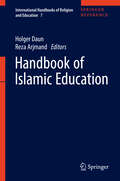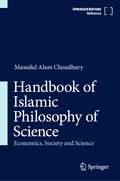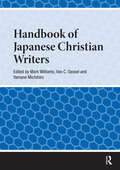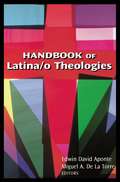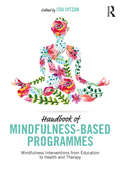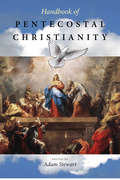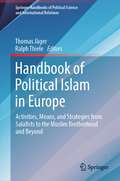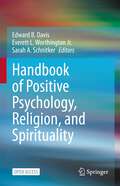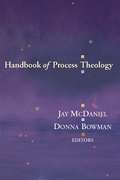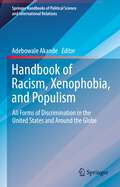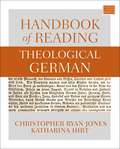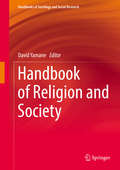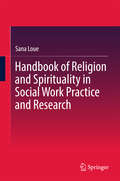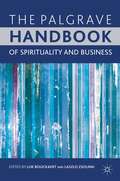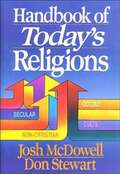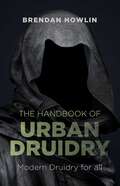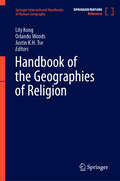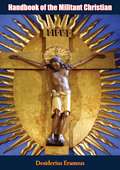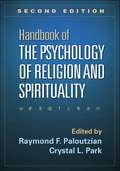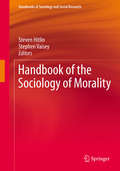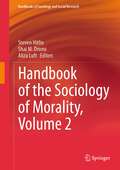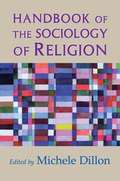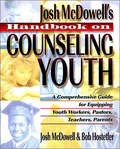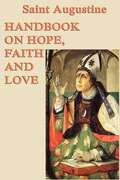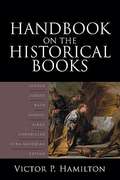- Table View
- List View
Handbook of Islamic Education (International Handbooks Of Religion And Education Ser. #7)
by Holger Daun Reza ArjmandThis Handbook traces and presents the fundamentals of Islam and their history and background, and provides a global and holistic, yet, detailed picture of Islamic education around the world. It introduces the reader to the roots and foundations of Islamic education; the responses of Islamic educational institutions to different changes from precolonial times, through the colonial era up to the contemporary situation. It discusses interactions between the state, state-run education and Islamic education, and explores the Islamic educational arrangements existing around the world. The book provides in-depth descriptions and analyses, as well as country case studies representing some 25 countries.The work reflects the recent series of changes and events with respect to Islam and Muslims that have occurred during the past decades. The globalization of Islam as a religion and an ideology, the migration of Muslims into new areas of the globe, and the increasing contacts between Muslims and non-Muslims reinforce the need for mutual understanding. By presenting Islamic education around the world in a comprehensive work, this Handbook contributes to a deeper international understanding of its varieties.
Handbook of Islamic Philosophy of Science: Economics, Society and Science
by Masudul Alam ChoudhuryThis handbook provides a comprehensive overview of Islamic ethical issues within a wide spectrum of philosophy of science topics, examining the development of the model of moral inclusiveness in economics, science and society from ontological, epistemological and analytical perspectives. This paradigm takes the view that ethics is systemically endogenous, and can be studied by the most rigorous scientific analysis pertaining to diverse issues and problems of ethicality in socio-scientific inquiry. This handbook takes a sweeping transdisciplinary approach that is deeply phenomenological, to the nature and logic of scientific inquiry of, and in, the Qur’an. Such an approach invokes the episteme of the unity of knowledge in the socio-scientific systemic sense. The volumes' respective sections focus on the nature, logic, and role that ethics plays in formulating new vistas of alternative epistemic futures in Islamic economics, finance, and the social sciences. The ideas presented are situated within the broader context of the post-modernist, post-pandemic, and the post-Covid-19 epoch, while being aimed at conceptualising a distinctive new outlook of transdisciplinary intellection in Islamic philosophy. The content is rigorously conceptual, qualitative, quantitative, and applied. Covering a diversity of subject areas from philosophy of science, to economics and in socio-scientific context within the realm of Islamic philosophy, this forms a key text for scholars in these respective arenas, led by pioneering scholarship in Islamic studies.
Handbook of Japanese Christian Writers (Handbooks on Japanese Studies)
by Van C. Gessel Mark Williams Yamane MichihiroAlthough a century and a half of Christian proselytizing has only led to the conversion of about one percent of the Japanese population, the proportion of writers who have either been baptized or significantly influenced in their work by Christian teachings is much higher. The seventeen authors examined in this volume have all employed themes and imagery in their writings influenced by Christian teachings. Those writing between the 1880s and the start of World War II were largely drawn to the Protestant emphasis on individual freedom, though many of them eventually rejected sectarian affiliation. Since 1945, on the other hand, Catholicism has produced a number of religiously committed authors, led by figures such as Endo Shusaku, the most popular and influential Christian writer in Japan to date. The authors discussed in these essays have contributed in a variety of ways to the indigenization of the imported religion.
Handbook of Latina/o Theologies
by Miguel A. De La Torre Edwin David AponteThis collection of thirty-four essays surveys how Latinos/as understand and do theology within those varied contexts. It gives attention to the history, nature, sources, and development of Latinos/as theological expressions within the U.S. and their contribution to the overall theological discourse and to the individual groups that gave rise to them. Part I of the handbook presents essays on many traditional topics in Christian theology representative both of the individual authors and various beliefs found in Latino/a communities. Part II focuses on trends and contextual issues within the overall Hispanic/Latino theological conversation.
Handbook of Mindfulness-Based Programmes: Mindfulness Interventions from Education to Health and Therapy
by Itai IvtzanHandbook of Mindfulness-Based Programmes: Mindfulness Interventions from Education to Health and Therapy offers the first comprehensive guide to all prominent, evidence-based mindfulness programmes available in the West. The rapid growth of mindfulness in the Western world has given rise to an unprecedented wave of creative mindfulness programmes, offering tailor-made mindfulness practices for school teachers, students, parents, nurses, yoga teachers, athletes, pregnant women, therapists, care-takers, coaches, organisational leaders and lawyers. This book offers an in-depth engagement with these different programmes, emphasising not only the theory and research but also the practice. Exercises and activities are provided to enable the reader to first understand the programme and then experience its unique approach and benefits. Handbook of Mindfulness-Based Programmes will enrich your knowledge and experience of mindfulness practice, whether you are a practitioner, researcher or simply interested in the application of mindfulness.
Handbook of Pentecostal Christianity
by Adam StewartHandbook of Pentecostal Christianity is an easy-to-read guide designed for those interested in learning about one of the fastest growing religious traditions in the world. Adam StewartÆs unique collection presents concise, yet comprehensive explanations of some of the most important terms and concepts needed to understand the origins and development, as well as the beliefs and practices, of Pentecostalism worldwide. Twenty-four scholars from five continents provide entries, which are written from disciplinary perspectives as diverse as anthropology, biblical studies, black church studies, history, religious studies, sociology, and theology. The fifty entries shed light on such aspects as The Azusa Street Mission and Revival, Baptism of the Holy Spirit, exorcism, Godly Love, prophecy, snake handling, and the Word of Faith movement. Each entry also includes a brief list of references and suggestions for further reading. These brief, engaging explanations on aspects of Pentecostalism can be read on their own, or alphabetically from start to finish. In its entirety, StewartÆs text provides the reader with an introduction to the history, theology, practices, and contemporary forms of Pentecostalism as it stands at the outset of the twenty-first century. StewartÆs handbook is an appealing introduction to Pentecostalism suitable for both students of religion and the curious general reader.
Handbook of Political Islam in Europe: Activities, Means, and Strategies from Salafists to the Muslim Brotherhood and Beyond (Springer Handbooks of Political Science and International Relations)
by Thomas Jäger Ralph ThieleThis book approaches the field of Political Islam from a European security perspective. Featuring various case studies and country surveys written by respected experts in the field, it offers a comparative perspective and comprehensive overview of the ideology and prevalence of Political Islam and its actors in more than 20 European states. The respective contributions identify key actors of Political Islam and reveal the activities, means, and strategies they pursue and employ across the continent. They also discuss if and how Political Islam could undermine the Western liberal democratic order and its associated values. By doing so, the volume offers approaches to analyzing Political Islam and thereby strengthening the resilience of liberal democratic societies, while also protecting Muslims from the radical ideology and agenda of Political Islam.Chapter - "Hybridizing Islam in the Balkans: The Rise of Salafi-Hanafism in Bulgaria" is licensed under the terms of the Creative Commons Attribution 4.0 International License (http://creativecommons.org/licenses/by/4.0/). For further details see license information in the chapter.
Handbook of Positive Psychology, Religion, and Spirituality
by Everett L. Worthington Edward B. Davis Sarah A. SchnitkerThis handbook aims to bridge the gap between the fields of positive psychology and the psychology of religion and spirituality. It is the authoritative guide to the intersections among religion, spirituality, and positive psychology and includes the following sections: (1) historical and theoretical considerations, (2) methodological considerations, (3) cultural considerations, (4) developmental considerations, (5) empirical research on happiness and well-being in relation to religion and spirituality, (6) empirical research on character strengths and virtues in relation to religion and spirituality, (7) clinical and applied considerations, and (8) field unification and advancement. Leading positive psychologists and psychologists of religion/spirituality have coauthored the chapters, drawing on expertise from their respective fields. The handbook is useful for social and clinical scientists, practitioners in helping professions, practitioners in religious and spiritual fields, and students of psychology and religion/spirituality.This is an open access book.
Handbook of Process Theology
by Jay Mcdaniel Donna BowmanThe essays cover important topics in Christian theology and philosophy of religion as well as interreligious dialogue, pastoral care, spirituality, the diversity of human experience, and cultural forms such as economics, politics, and the arts. Through the Handbook of Process Theology readers will gain an appreciation of the richness and scope of the process approach to spiritual living.
Handbook of Racism, Xenophobia, and Populism: All Forms of Discrimination in the United States and Around the Globe (Springer Handbooks of Political Science and International Relations)
by Adebowale AkandeThis handbook presents the roots of symbolic racism as partly in both anti-black antagonism and non-racial conservative attitudes and values, representing a new form of racism independent of older racial and political attitudes. By doing so, it homes in on certain historical incidents and episodes and presents a cogent analysis of anti-black, Jim Crowism, anti-people of color (Black, Latino, Native Americans), and prejudice that exists in the United States and around the world as a central tenet of racism. The book exposes the reader to the nature and practice of stereotyping, negative bias, social categorization, modern forms of racism, immigration law empowerment, racialized incarceration, and police brutality in the American heartland. It states that several centuries of white Americans’ negative socializing culture marked by widespread negative attitudes toward African Americans, are not eradicated and are still rife. Further, the book provides a panoramic view of trends of racial discrimination and other negative and desperate challenges that Black, Indigenous, and People of Color face across the world. Finally, the volume examines xenophobia, racism, prejudice, and stereotyping in different contexts, including topics such as Covid-19, religion and racism, information manipulation, and populism. The book, therefore, is a must-read for students, researchers, and scholars of political science, psychology, history, sociology, communications/media studies, diplomatic studies, and law in general, as well as ethnic and racial studies, American politics, global affairs, populism, and discrimination in particular.
Handbook of Reading Theological German
by Christopher Ryan Jones Katharina HirtThe Handbook of Reading Theological German is the premier resource for equipping those interested in reading and translating original German source materials and preparing academics for German comprehension examination. The book is ideal for students in biblical studies, church history, Jewish studies, and theology. Coauthored by Katharina Hirt, a native German speaker and professional linguist, and Christopher Ryan Jones, a native English speaker and doctoral candidate in biblical studies, this collaboration draws on the latest developments in linguistics to present a cutting-edge teaching methodology for graduate students learning to read German for research.Attuned to the specific needs of English speakers learning German, this handbook is well suited for independent study or for use in the classroom. Providing abundant exercises and readings, Jones and Hirt&’s work provides an excellent entry point for students required to learn theological German.The Handbook of Reading Theological German provides:An introduction to German grammarA demonstration of the role that German theology has had in the development of modern Jewish and Christian practices.Guided readings and biographies of six major German theologians and philosophersFurther, advanced readings with minimal guidance from contemporary authors in the areas of Hebrew Bible, New Testament, Jewish studies, church history, and theology, so that students can focus on literature from their chosen field of study
Handbook of Religion and Society
by David YamaneThe Handbook of Religion and Society is the most comprehensive and up-to-date treatment of a vital force in the world today. It is an indispensable resource for scholars, students, policy makers, and other professionals seeking to understand the role of religion in society. This includes both the social forces that shape religion and the social consequences of religion. This handbook captures the breadth and depth of contemporary work in the field, and shows readers important future directions for scholarship. Among the emerging topics covered in the handbook are biological functioning, organizational innovation, digital religion, spirituality, atheism, and transnationalism. The relationship of religion to other significant social institutions like work and entrepreneurship, science, and sport is also analyzed. Specific attention is paid, where appropriate, to international issues as well as to race, class, sexuality, and gender differences. This handbook includes 27 chapters by a distinguished, diverse, and international collection of experts, organized into 6 major sections: religion and social institutions; religious organization; family, life course, and individual change; difference and inequality; political and legal processes; and globalization and transnationalism.
Handbook of Religion and Spirituality in Social Work Practice and Research
by Sana LoueThis singular reference explores religion and spirituality as a vital, though often misconstrued, lens for building better understanding of and empathy with clients. A diverse palette of faiths and traditions is compared and contrasted (occasionally with secularism), focusing on areas of belief that may inspire, comfort, or trouble clients, including health and illness, mental illness, healing, coping, forgiveness, family, inclusion, and death. From assessment and intervention planning to conducting research, these chapters guide professionals in supporting and assisting clients without minimizing or overstating their beliefs. In addition, the book's progression of ideas takes readers beyond the well-known concept of cultural competence to model a larger and more meaningful cultural safety. Among the topics included in the Handbook: Integrating religion and spirituality into social work practice. Cultural humility, cultural safety, and beyond: new understandings and implications for social work. Healing traditions, religion/spirituality, and health. Diagnosis: religious/spiritual experience or mental illness? Understandings of dying, death, and mourning. (Re)building bridges in and with family and community. Ethical issues in conducting research on religion and spirituality. The Handbook of Religion and Spirituality in Social Work Practice and Research is a richly-textured resource for social workers and mental health professionals engaged in clinical practice and/or research seeking to gain varied perspectives on how the religion and spirituality of their clients/research participants may inform their work.
Handbook of Spirituality and Business
by Laszlo Zsolnai Luk BouckaertA summary of the most important issues, approaches and models in the field of spirituality in business, economics and society. The Handbook of Spirituality and Business presents a comprehensive pluralistic view covering all the major religious and spiritual traditions.
Handbook of Today's Religions
by Don Stewart Josh McDowellDon't rely on news stories or a one-sided defense of cults, the occult, or secular and non-Christian religions. This handbook provides authoritative, evangelical perspectives on alternative religions. It includes thorough, accurate information for analyzing and measuring these groups' claims and beliefs against God's Word.
Handbook of Urban Druidry: Modern Druidry for All
by Brendan HowlinDruidry is currently exciting much interest but has an image that is not usually associated with urban life. In The Handbook of Urban Druidry, author Brendan Howlin presents Druidry in an easy-to-understand way, making the concepts open to everyone.
Handbook of the Geographies of Religion (Springer International Handbooks of Human Geography)
by Lily Kong Orlando Woods Justin K. H. TseThis international and interdisciplinary handbook offers a comprehensive and an in-depth overview of contemporary research, theory, and practice in the geographies of religion in various parts of the world and with different populations. The book showcases the major theoretical interventions in the field and the debates about the existential constitution of sacred space and what this means for secularization. It outlines the most significant geographical themes related to these new developments, with their implications for how to think about landscapes, space, bodies, and worlds. The book also discusses the future of the field, especially in the realms of encounters and ethics, economies and markets, institutions and organisations, movements and migrations, and media and mediums. It also offers views from disciplines outside of geography, including from sociology, anthropology, religious studies, and media and communications, which demonstrates the contributions of geographers of religion to wider intellectual conversations and debates.
Handbook of the Militant Christian
by Desiderius ErasmusHandbook of the Militant Christian (Latin: Enchiridion militis Christiani), which has also been translated as Handbook of a Christian Knight and The Manual of a Christian Knight, is a work written by Dutch scholar Desiderius Erasmus of Rotterdam in 1503. First published in English in 1533 by William Tyndale, this is the 1962 English edition by John Patrick Dolan.During a stay in Tournehem, a castle near Saint-Omer in the north of modern-day France, Erasmus encountered an uncivilized, yet friendly soldier who was an acquaintance of Battus, Erasmus’ close friend. On the request of the soldier’s pious wife, who felt slighted by her husband’s behaviour, Battus asked Erasmus to write a text which would convince the soldier of the necessity of mending his ways, which he did. The resulting work was eventually re-drafted by Erasmus and expanded into the Enchiridion militis Christiani. The Enchiridion is an appeal on Christians to act in accordance with the Christian faith rather than merely performing the necessary rites. It became one of Erasmus’ most influential works.
Handbook of the Psychology of Religion and Spirituality, Second Edition
by Raymond F. Paloutzian Crystal L. ParkWidely regarded as the definitive reference, this volume comprehensively examines the psychological processes associated with religion and spirituality. Leading scholars from multiple psychological subdisciplines present developmental, cognitive, social psychological, cultural, and clinical perspectives on this core aspect of human experience. The forms and functions of religious practices and rituals, conversion experiences, and spiritual struggles are explored. Other key topics include religion as a meaning system, religious influences on prosocial and antisocial behavior, and connections to health, coping, and psychotherapy.New to This Edition*Two chapters on cross-cultural issues.*Chapters on spiritual goals, emotional values, and mindfulness.*Reflects significant theoretical and empirical developments in the field.*Many new authors and extensively revised chapters.*Robust index amplifies the volume's usefulness as a reference tool.
Handbook of the Sociology of Morality
by Stephen Vaisey Steven HitlinHuman beings necessarily understand their social worlds in moral terms, orienting their lives, relationships, and activities around socially-produced notions of right and wrong. Morality is sociologically understood as more than simply helping or harming others; it encompasses any way that individuals form understandings of what behaviors are better than others, what goals are most laudable, and what "proper" people believe, feel, and do. Morality involves the explicit and implicit sets of rules and shared understandings that keep human social groups intact. Morality includes both the "shoulds" and "should nots" of human activity, its proactive and inhibitive elements. At one time, sociologists were centrally concerned with morality, issues like social cohesion, values, the goals and norms that structure society, and the ways individuals get socialized to reproduce those concerns. In the last half-century, however, explicit interest in these topics has waned, and modern sociology has become uninterested in these matters and morality has become marginalized within the discipline. But a resurgence in the topic is happening in related disciplines - psychology, neurology, philosophy, and anthropology - and in the wider national discourse. Sociology has much to offer, but is not fully engaged in this conversation. Many scholars work on areas that would fall under the umbrella of a sociology of morality but do not self-identify in such a manner, nor orient their efforts toward conceptualizing what we know, and should know, along these dimensions. The Handbook of the Sociology of Morality fills a niche within sociology making explicit the shared concerns of scholars across the disciplines as they relate to an often-overlooked dimension of human social life. It is unique in social science as it would be the first systematic compilation of the wider social structural, cultural, cross-national, organizational, and interactional dimension of human moral (understood broadly) thought, feeling, and behavior.
Handbook of the Sociology of Morality, Volume 2 (Handbooks of Sociology and Social Research)
by Steven Hitlin Shai M. Dromi Aliza LuftThis handbook articulates how sociology can re-engage its roots as the scientific study of human moral systems, actions, and interpretation. This second volume builds on the successful original volume published in 2010, which contributed to the initiation of a new section of the American Sociological Association (ASA), thus growing the field. This volume takes sociology back to its roots over a century ago, when morality was a central topic of work and governance. It engages scholars from across subfields in sociology, representing each section of the ASA, who each contribute a chapter on how their subfield connects to research on morality. This reference work appeals to broader readership than was envisaged for the first volume, as the relationship between sociology as a discipline and its origins in questions of morality is further renewed. The volume editors focus on three areas: the current state of the sociology of morality across a range of sociological subfields; taking a new look at some of the issues discussed in the first handbook, which are now relevant in sometimes completely new contexts; and reflecting on where the sociology of morality should go next. This is a must-read reference for students and scholars interested in topics of morality, ethics, altruism, religion, and spirituality from across the social science.
Handbook of the Sociology of Religion
by Michele DillonThis Handbook showcases research and thinking in the sociology of religion. The contributors, all active writers and researchers in the area, provide original chapters focusing on select aspects of their own engagement with the field. Aimed at students and scholars who want to know more about the sociology of religion, this handbook also provides a resource for sociologists in general by integrating broader questions of sociology (e.g. demography, ethnicity, life course, inequality, political sociology) into the analysis of religion. Broadly inclusive of traditional research topics (modernity, secularization, politics) as well as newer interests (feminism, spirituality, faith based community action), this handbook illustrates the validity of diverse theoretical perspectives and research designs to understanding the multi-layered nature of religion as a sociological phenomenon.
Handbook on Counseling Youth
by Bob Hostetler John McDowellThoroughly researched, this easy-to-use handbook is designed to help parents, teachers, pastors and youth workers guide today's young people through the minefields of adolescence. From simple challenges to major crises, this book will equip adults to help youth cope with situations involving emotional issues, abuse, addictions, family issues, disorders, sexual issues and much more.
Handbook on Hope, Faith and Love
by Saint Augustine"Faith, Hope, and Love" is a compact treatise on Christian piety, written in response to a request by an otherwise unknown person, named Laurentius, shortly after the death of Saint Jerome in 420. It is intended as a model for Christian instruction or catechesis. As the title indicates, the work is organized according to the three graces necessary for the Christian worship of God: Faith, Hope, and Love.
Handbook on the Historical Books: Joshua, Judges, Ruth, Samuel, Kings, Chronicles, Ezra-nehemiah, Esther
by Victor P. HamiltonFrom the tumbling walls of Jericho to a Jewish girl who became the queen of Persia, the historical books of the Bible are intriguing and unquestionably fascinating. In this comprehensive introduction, veteran Old Testament professor Victor Hamilton demonstrates the significance of the messages contained in these biblical books by carefully examining content, structure, and theology. He details the events and implications of each book chapter by chapter, providing useful commentary on overarching themes and the connections and parallels between Old Testament texts.
